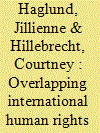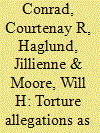|
|
|
Sort Order |
|
|
|
Items / Page
|
|
|
|
|
|
|
| Srl | Item |
| 1 |
ID:
120825


|
|
|
|
|
| Publication |
2013.
|
| Summary/Abstract |
The Ill-Treatment and Torture (ITT) Data Collection Project uses content analysis to measure allegations of government ill-treatment and torture made by Amnesty International (AI) from 1995 to 2005. ITT's country-year (CY) data quantify AI allegations of ill-treatment and torture at the country-year unit of observation and further across different responsible government agents and across different econo-socio-political groups of alleged victims. This paper introduces the Ill-Treatment and Torture country-year data, describes quantitative patterns likely to be of interest to researchers focused on the study of international non-governmental organizations (INGOs) and human rights, and suggests a number of theoretically motivated questions that can be explored using the ITT country-year data.
|
|
|
|
|
|
|
|
|
|
|
|
|
|
|
|
| 2 |
ID:
175192


|
|
|
|
|
| Summary/Abstract |
With the proliferation of the international human rights regime, states confront a dense set of institutional commitments. Our knowledge of the influence of these commitments is limited for two reasons. First, scholars largely focus on the effect of treaty ratification on states’ human rights behavior, but states engage with these institutions after ratification via regional human rights court rulings and UN recommendations. Second, scholars often examine these institutions in isolation. The institutions do not operate in isolation, however, nor do states necessarily consider the requests they receive from these institutions independently. In this article, we introduce the Women’s Rights Recommendations Digital Database (WR2D2), which maps the various recommendations international women’s rights institutions make on European states. We begin by discussing the importance of recommendations from international institutions and their relationship with commitment and compliance. We then describe the data collection effort, including two dimensions on which recommendations made to European states vary – precision and action. Next, we report descriptive statistics from the dataset, including regional and temporal trends. We conclude with a discussion of the multifaceted research agenda that this new dataset can facilitate.
|
|
|
|
|
|
|
|
|
|
|
|
|
|
|
|
| 3 |
ID:
132357


|
|
|
|
|
| Publication |
2014.
|
| Summary/Abstract |
The Ill-Treatment and Torture (ITT) Data Collection Project uses content analysis to measure a number of variables on more than 15,000 public allegations of government ill-treatment and torture made by Amnesty International (AI) from 1995 to 2005. The ITT specific allegation (SA) event data use the torture allegation as the unit of observation, thus permitting users to manipulate them for a wide variety of purposes. In this article, we introduce the ITT SA data. We first describe the key variables in the SA data and report a number of bivariate descriptive statistics to illustrate some of the research questions that might be usefully investigated with the data. We then discuss how we believe the ITT SA data can be used to study not only AI's naming and shaming behavior, but also states' (lack of) compliance with the United Nations Convention Against Torture (CAT). We conclude with an empirical analysis using the SA data that investigates the effect of domestic political institutions on formal complaints, investigations, and adjudication of torture allegations. We show that legislative checks are positively associated with complaints, investigations, and trials; elections and freedom of speech are positively associated with investigations and trials; and powerful judiciaries are associated only with investigations.
|
|
|
|
|
|
|
|
|
|
|
|
|
|
|
|
|
|
|
|
|